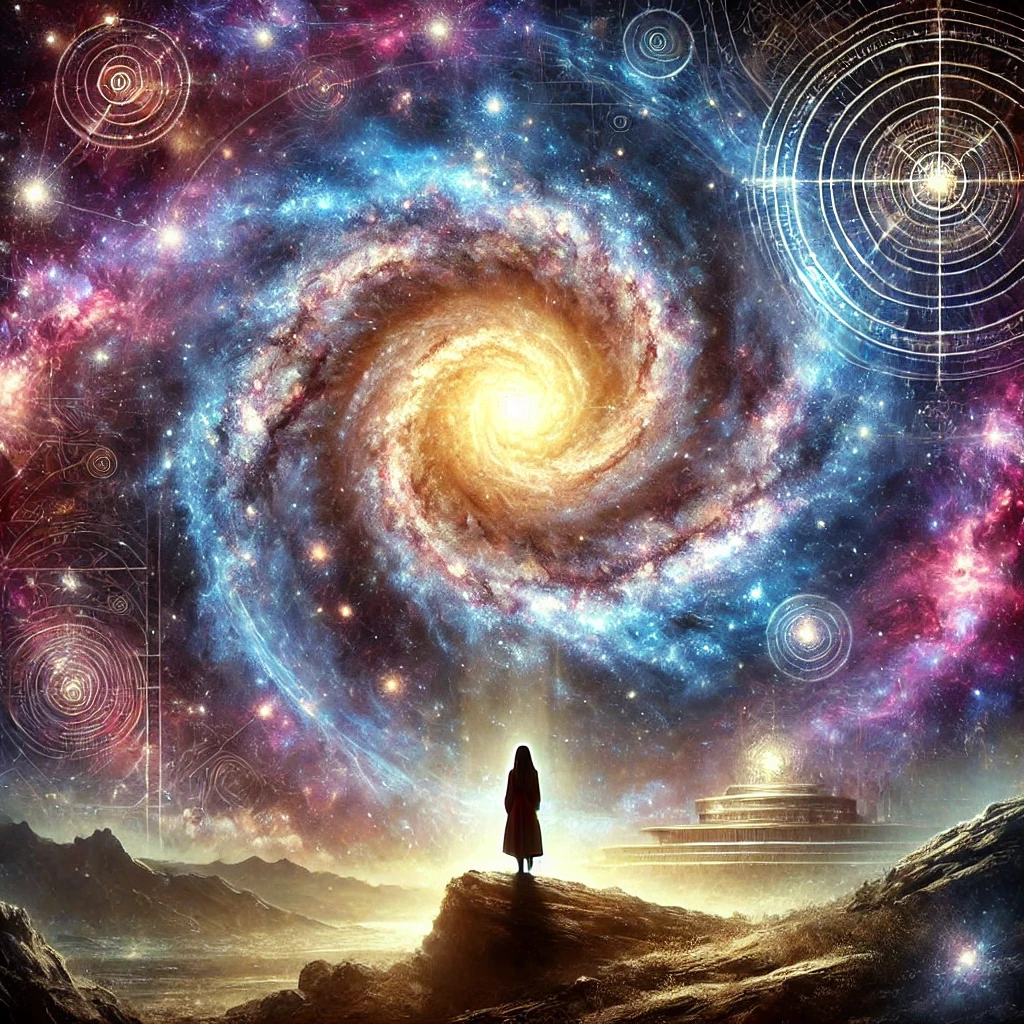Hello there, dreamers and deep thinkers,
What does it mean to live in the universe, to be a part of something so vast, infinite, and mysterious? This question has haunted humanity since the dawn of consciousness. From ancient myths to modern physics, we’ve woven countless narratives to make sense of our place in the grand cosmic story. Let’s take a journey through these perspectives—spiritual, psychological, philosophical, religious, and scientific—to explore how humanity has sought to understand the universe and our role in it.
Ancient Roots: Myths and Mysticism
In ancient times, the universe was a living, breathing entity—sacred and mysterious. Cultures across the globe imagined the cosmos as a divine creation, where gods, spirits, and forces of nature were deeply interwoven with human existence.
The Vedas of ancient India describe the universe as an eternal cycle of creation and destruction, a rhythmic dance governed by Brahman, the ultimate reality. Similarly, the Egyptians saw the cosmos as a manifestation of divine order (Ma’at), while the Greeks envisioned it as a harmonious system driven by the laws of nature, with philosophers like Pythagoras uncovering mathematical relationships they believed mirrored the divine structure of reality.
These early views gave birth to the idea of interconnectedness—a principle echoed in spiritual practices even today. The ancient shamanic traditions saw the cosmos as an intricate web where every being, from stars to humans, played a vital role.
Philosophy: The Search for Meaning
As humanity began to turn inward, philosophy emerged to question not only the universe but also our place within it. Socrates, Plato, and Aristotle wrestled with profound questions: Is there a purpose to existence? Is the universe chaotic or ordered? Plato’s theory of Forms suggested that the physical world is a shadow of a higher, perfect reality.
Centuries later, Immanuel Kant would argue that the human mind actively shapes our understanding of the universe, emphasizing that reality might be fundamentally unknowable. Existentialists like Sartre and Camus challenged us to find meaning in a seemingly indifferent universe, urging us to create purpose in the face of absurdity.
Religion: A Divine Plan?
Religions have long offered answers to the cosmos’ mysteries, placing humanity in a divine framework. In Christianity, the universe is God’s creation, and humans are its stewards, imbued with purpose and a moral obligation to care for the Earth. Similarly, Islam sees the cosmos as a sign of Allah’s greatness, a testament to divine order.
Buddhism, in contrast, approaches the universe through impermanence and interdependence. The concept of dependent origination suggests that everything arises in connection to everything else—no being or phenomenon exists independently. This perspective aligns strikingly with modern ecological and quantum theories, showing how ancient wisdom continues to resonate.
Psychology: The Universe Within
If the universe is vast, so too is the human mind—a microcosm reflecting the macrocosm. Carl Jung explored this connection through his idea of the collective unconscious, suggesting that humanity shares archetypal patterns deeply tied to the cosmos. Dreams, myths, and symbols, he believed, are how the universe speaks to us on a personal level.
Modern psychology builds on this, studying how awe and wonder—feelings often triggered by contemplating the universe—can enhance mental health. Research shows that gazing at the stars can foster a sense of humility, interconnectedness, and purpose, reminding us that we are part of something much larger than ourselves.
Science: The Language of the Cosmos
Science has transformed our understanding of the universe, unveiling its grandeur in ways unimaginable to our ancestors. Copernicus displaced Earth from the center of the cosmos, Newton described the laws governing celestial bodies, and Einstein revealed the relativity of space and time.
Modern physics takes us further still. The Big Bang Theory suggests the universe began 13.8 billion years ago, a singularity expanding into the vast cosmos we see today. Quantum mechanics, meanwhile, challenges our intuitive understanding of reality, revealing a universe where particles exist in states of probability and observation influences outcomes.
Astrobiology and cosmology ask profound questions about life’s rarity and purpose. Are we alone in the universe, or are we part of a cosmic tapestry teeming with life? As we send probes to Mars and gaze into distant galaxies with the James Webb Telescope, we inch closer to answers.
A Holistic Understanding: The Interconnected Cosmos
So where do we fit into this vast picture? Each perspective offers unique insights, but together they paint a holistic view. The spiritual teaches us that we are deeply connected to the universe. Philosophy challenges us to seek meaning. Religion provides moral and metaphysical frameworks. Psychology shows that the universe is mirrored within us. And science reveals the intricate workings of the cosmos.
In a sense, we are the universe becoming aware of itself. As Carl Sagan famously said, “We are star stuff.” The atoms in our bodies were forged in the hearts of dying stars, and the energy that powers our lives is a ripple in the great cosmic dance.
Moving Forward: Finding Our Place
To understand the universe and our place in it is to embrace wonder and humility. The quest is ongoing, a journey that invites us to explore not just the stars but also our own hearts and minds. Whether through meditation, scientific inquiry, or philosophical reflection, we participate in the grand human endeavor of understanding.
Perhaps the most profound realization is this: while the universe is vast, each of us carries a piece of it within. Every thought, action, and connection contributes to the ever-unfolding story of existence. To live authentically is to honor this truth, to embrace the mystery, and to revel in the beauty of being alive, here and now, in the great cosmic expanse.
So, what’s your place in the universe? Perhaps it’s not a single answer but a tapestry of experiences, beliefs, and discoveries. One thing is certain: your existence matters, for without you, the universe would not be complete.
Thanks for reading friends! Stay curious,
April
Cognitive Psycho




